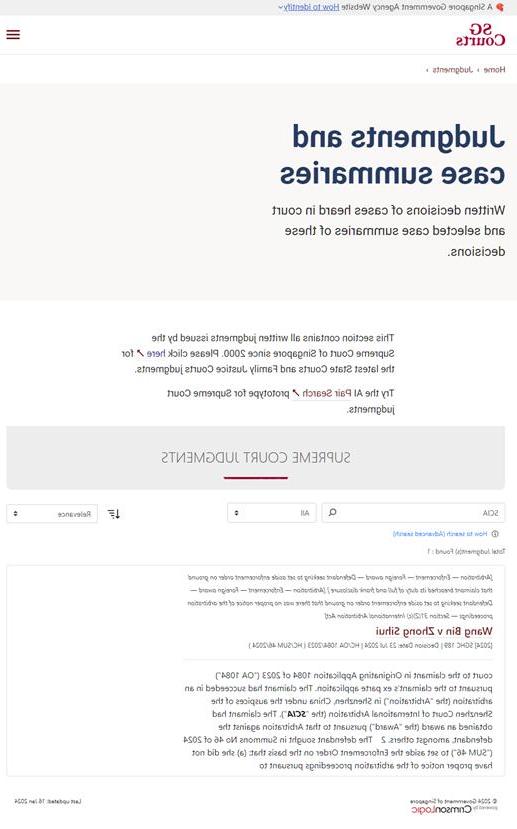
Singapore High Court Recognizes and Enforces SCIA’s Arbitral Award, Confirming the Validity of SCIA Electronic Service

Recently, the High Court of Singapore recognized and enforced an arbitral award made by the Shenzhen Court of International Arbitration (SCIA), according to the United Nations Convention on the Recognition and Enforcement of Foreign Arbitral Awards (the “New York Convention”). In the case of Wang Bin v Zhong Sihui [2024] SGHC 189, the High Court of Singapore rejected the respondent Zhong Sihui’s application for non-enforcement of the arbitral award based on the claim of lack of proper arbitration notice. The High Court also confirmed the validity of SCIA’s cross-border electronic delivery service via SMS on mobile phones.
 Judgements and Case Summaries on the Official Website of Singapore Courts (SG Courts)
Judgements and Case Summaries on the Official Website of Singapore Courts (SG Courts)
The original arbitration case accepted by the SCIA was a dispute over a foreign-related loan contract. The case included a number of respondents, one of whom, Zhong Sihui, is a Singapore citizen. During the arbitration proceedings, the SCIA delivered the arbitration documents to all respondents using various methods, including EMS mail, email and mobile phone SMS based on the service address information of the respondents provided by the claimant. All the other respondents except Zhong Sihui entrusted their agents to respond the case, and Zhong Sihui failed to respond and attend the hearing after being legally notified. The tribunal conducted the hearing in absentia in accordance with the provisions of the law and the SCIA Arbitration Rules. The tribunal awarded that the two respondents in the case, including Zhong Sihui, as joint borrowers, are obligated to repay the claimant. The remaining respondents, as guarantors, should bear joint liability for the repayment of the loan in accordance with the contract.
After the arbitral tribunal issued the award, Zhong Sihui failed to fulfill the repayment obligation. The claimant later applied to the High Court of Singapore for recognition and enforcement of the arbitral award under the New York Convention. In the enforcement of the case, Zhong Sihui argued that she had not received any notice of arbitration, that the mobile phone number on which the SMS was delivered in this case was not owned by her. Although the phone was indeed in Singapore, her children and domestic helper mainly used it and therefore she did not check the messages on that phone. Zhong Sihui then applied for setting aside of the arbitral award.
After reviewing the case, the High Court of Singapore, taking into account the relevant provisions of Article 6 of the SCIA Arbitration Rules on “Service” and the records of electronic delivery, held that the service of the SCIA on Zhong Sihui in this case by means of a mobile phone text message was valid, and that Zhong Sihui had actually received the notice of arbitration. The High Court concluded that Zhong Sihui had indeed received the notice of arbitration. In the High Court’s reasoning, in addition to discussing the fact that the mobile phone number was indeed under the “custody and control” of Zhong Sihui in the light of the evidentiary material, the court also emphasized the vital evidence supporting the validity of the mode of service — the electronic service record of the SCIA clearly and in detail shows that the message was “sent on [specific date and time] to the [certain phone number]. On [specific date and time], a user from [certain phone number] read the content of the message via mobile phone.”
 The Electronic Delivery Records on SCIA Online Arbitration System
The Electronic Delivery Records on SCIA Online Arbitration System
2.Significance of the Case
This case reflects the recognition and support of the Singapore High Court for the electronic mode of service by the SCIA, drawing significant attention from the arbitral sector, with a number of experts believing that it has precedential values and will profoundly impact the cross-border electronic service in international arbitration. The case affirmed the validity of SMS message services in cross-border arbitration cases, and highlighted that the detailed service records kept by arbitration institutions when using electronic means of service will play a crucial role in the subsequent recognition and enforcement of the award.
In 2016, the SCIA amended its arbitration rules to include the provision for electronic service. Article 6 of the SCIA Arbitration Rules on “Service” specifies that “Unless otherwise agreed by the parties, all written documents, notices and materials in relation to the arbitration proceedings may be delivered in person or sent by mail, facsimile, electronic mail, or any other means of electronic data interchange that can provide a record of delivery, or by any other means the SCIA considers appropriate.” With the implementation of the Online Arbitration system and smart arbitration services, SCIA always maintains clear and detailed electronic delivery records, which provides solid support for the proper management of the service process by arbitration institutions, the effective participation of the parties in the arbitration proceedings, as well as the recognition and enforcement of arbitral awards.
In recent years, the SCIA has further explored the “synchronous electronic service” between parties. Article 6 of the SCIA Arbitration Rules on “Service” specifies in its fifth paragraph that “Unless otherwise agreed by the parties, the SCIA or the arbitral tribunal may permit a party to directly send arbitral documents and evidentiary materials to the other party at the same time as the submission thereof to the SCIA or the arbitral tribunal, or to send them directly to the online arbitration platform of the SCIA, and then submit the record of delivery to the SCIA. The time of delivery will be determined by the SCIA or the arbitral tribunal according to the record of delivery.”
To encourage parties to use the efficient method to resolve dispute, the SCIA issued the Arrangement by the SCIA Arbitration for Promoting Harmonious and Efficient Dispute Resolution. Article 2 of the Arrangement stipulates, “Effective from January 1, 2024, for cases accepted from January 1, 2024, if both parties confirm and cooperate in the synchronous electronic delivery of case materials on SCIA’s online arbitration service platform, a 20% reduction in arbitration fees will be granted.”
Currently, the “synchronous electronic service” has been applied in the vast majority of arbitration cases accepted by the SCIA. Through the synchronous function on the SCIA online arbitration system, parties can promptly access various arbitral documents, such as the notice of arbitration and case materials submitted by other parties. The system automatically generates reading records upon viewing, and it will accurately display the service status.
Note: The members of the arbitral tribunal in this case are Xu Zhiguang (the Presiding Arbitrator), Chen Guoyao, and Huang Bin, and the tribunal secretary is Chi Wenhui.

Navigation
Arbitration Rules Model Arbitration Clauses Find an Arbitrator SCIA Guidelines Online Case Filing Online Office Fee Calculation X



